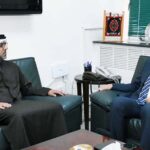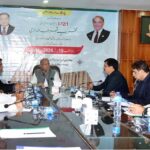AWARAN, Jan 23 (APP): Chairperson, Benazir Income Support Programme (BISP) Marvi Memon Monday assured the people of Balochistan that through new survey in August and biometric payment system by 2018, poverty would be managed better in all districts of Pakistan especially in Balochistan.
She said this during her visit to various primary schools being run under the Waseela-e-Taleem programme and BISP Beneficiary Committees (BBCs) operating here.
She said poverty alleviation was key for decreasing deprivations and insurgency in Balochistan, adding BISP intend to increase staff in Balochistan including offices at earliest to handle better servicing of its beneficiaries.
“The BISP treats equally all the provinces and regions of the country. The remote and deprived areas are on our priority list,” she said.
Besides financial assistance, Marvi said, BISP was aimed at uplifting these areas by investing in the education of children through Waseela-e-Taleem – a long term graduation strategy for the poorest of the poor, a press release said.
The visit was aimed at reviewing condition of BISP children beneficiaries enrolled under Waseela-e-Taleem, attendance of students, get first hand knowledge of the problems being faced by children, teachers and BISP staff besides gauging the level of cooperation provided by provincial and district education departments.
BISP has signed MoUs with provincial governments for cooperation in the enrollment of children in schools and their attendance compliance.
Under the Waseela-e-Taleem, a Conditional Cash Transfer programme, BISP gives Rs 750 per quarter per child to beneficiary families besides quarterly stipend of Rs 4,834 for sending their 5 to 12 year old children to primary schools with the condition of 70 percent compulsory attendance compliance.
In 32 districts across the country, BISP has enrolled 1.3 million children in schools and aims to enroll two million children by December 2017.
In Balochistan, 27,940 children are enrolled under Waseela-e-Taleem in six districts of Awaran, Gwadar, Jhal Magsi, Loralai, Musakhel and Naushki.
In Awaran, 2,099 children are enrolled in primary schools.
Total number of BBCs in Balochistan districts is 1,648.
BBC is a committee comprised of 25-30 woman beneficiaries who elect their leader. The committee holds meetings twice a month to discuss the issues of education of children and other problems of social, financial and political nature.
These committees are a source of women empowerment and mobilization, vital for the success of Waseela-e-Taleem. Chairperson BISP also interacted with the women of BBCs and listened to their suggestions and feedback.
During the visits, Chairperson BISP stated that Waseela-e-Taleem initiative has a positive and significant impact on primary school enrollment.
As per third impact evaluation report by Oxford Policy Management (OPM), School attendance deprivation on MPI indicator has reduced from 56 percent in 2013 to 49 percent in 2016 due to BISP.
Enrollment of children in schools between ages of 5-12 has increased by 10 percent points which is higher than the international average.
Marvi Memon also informed that BISP has developed a hi-tech application for continuous monitoring of attendance compliance of children enrolled in primary schools.
The app is supplemented with GPS that will update the attendance status online making the attendance compliance easy and transparent for BISP.
New survey in August, biometric payments from 2018: Marvi





